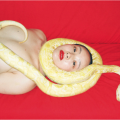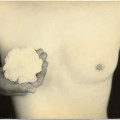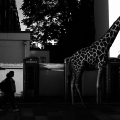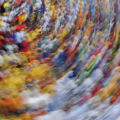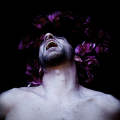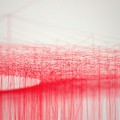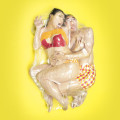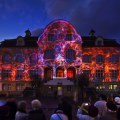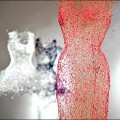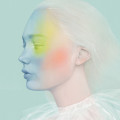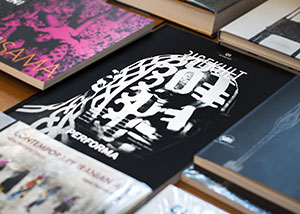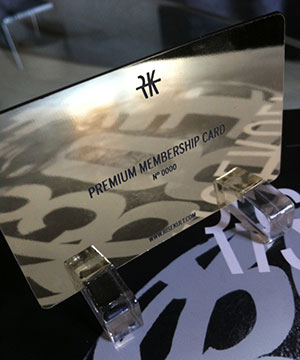Mika Rottenberg was born in Buenos Aires, Argentina in 1976. She immigrated to Israel with her family in 1977. In 1998, she graduated from Hamidrasha, Bait Berl College of Arts, Israel. In 2000, Rottenberg moved to New York to continue her education, receiving a Bachelor of Fine Arts from the School of Visual Arts in 2000 and a Master of Fines Arts from Columbia University in 2004. She is currently represented by Andrea Rosen Gallery in New York.
Rottenberg’s video works feature women with various physical eccentricities, such as being very tall, large-bodied, or muscular, performing physical acts that serve as an allegory for the human condition in post-modern times. Her videos are inspired by stories where women have an unusual characteristic about their bodies that makes them a commodity.
“Mika Rottenberg envisions the female body as a microcosm of larger societal issues such as labor and class inequities. In her short films, women cast for their notable physical features and talents perform perfunctory factory-line duties, manufacturing inane items worth less than the labor required to make them. Her homemade machinery and decor are functional but crudely constructed. These contraptions, operating by pedal, conveyor belt, paddle, rubber band, or string, are reminiscent of Peter Fischli and David Weiss’s kinetic props, though the human interaction in her works adds a carnivalesque element to Rottenberg’s environments, the physical comedy implicit in her narratives recalling Eleanor Antin’s filmed performances. The bright colors of Rottenberg’s self-contained sets don’t disguise the close quarters in which her characters work or mitigate the sense of claustrophobia induced by a dead-end job. A blue-collar work ethic is conjured through the women’s uniforms, ranging from diner-waitress dresses to jogging suits. Her cast often use several body parts at once, reminding the viewer of the feminine capacity for multitasking while it suggests an ironic futility in her sweatshop-like situations.
Rottenberg’s newest film, Cheese (2007), conflates farm-girl imagery with the fairy tale “Rapunzel” into a story loosely based on the Sutherland Sisters, renowned for their extremely long hair. Floating through a pastoral yet mazelike setting of raw wooden debris cobbled together into a benign shantytown, six longhaired women in flowing white nightgowns “milk” their locks and the goats they live with to generate cheese. Shots of animals crowded in pens and the sisters’ bunk bed– cluttered room visually compare the women to their ruminant allies. As nurturing caretakers, these women represent maternal aspects of Mother Nature. Here Rottenberg investigates feminine magic, the ability to “grow things out of the body” as she says, as the ultimate, wondrous physical mystery.”


















